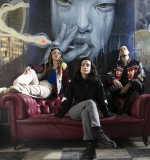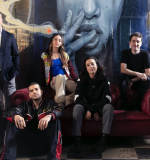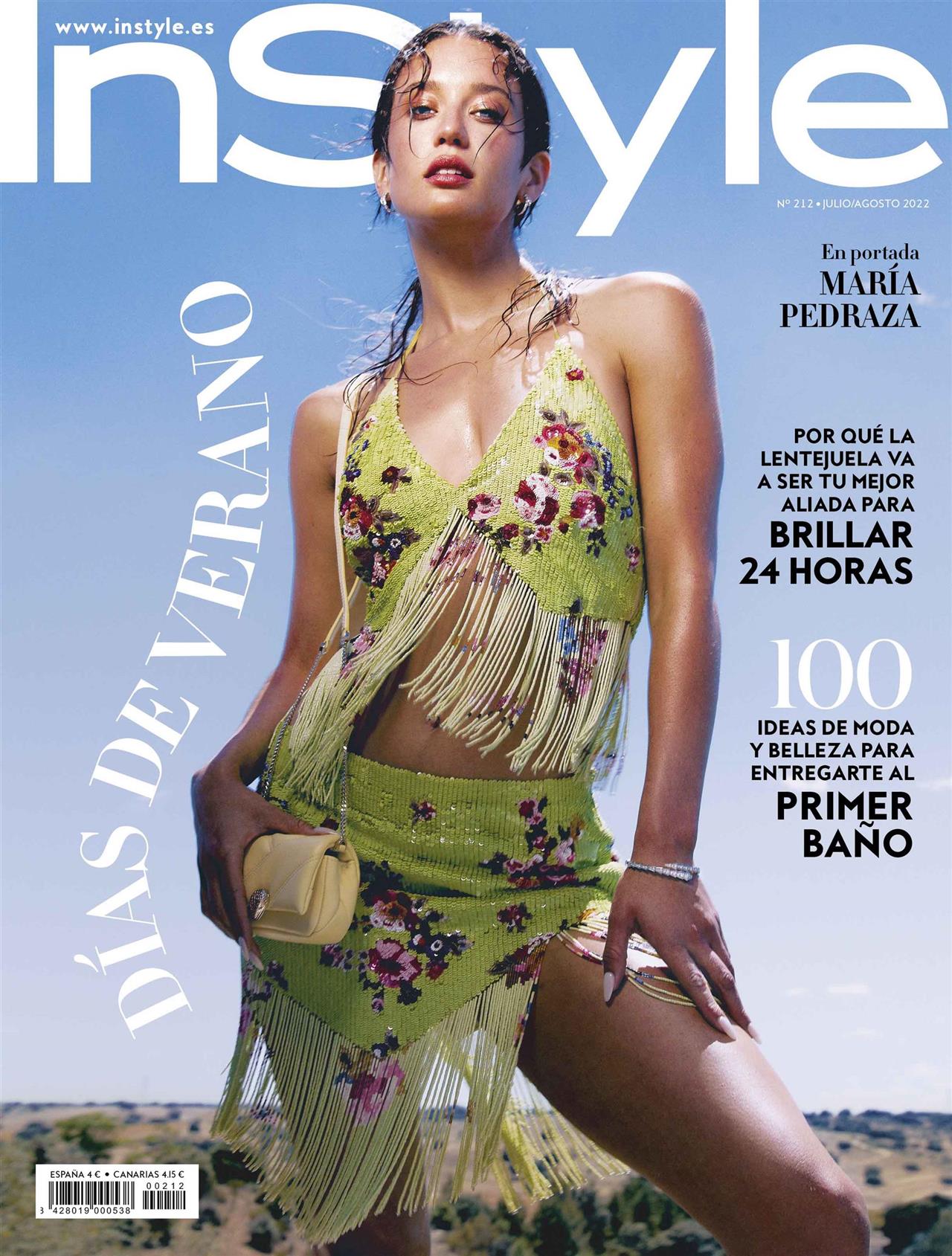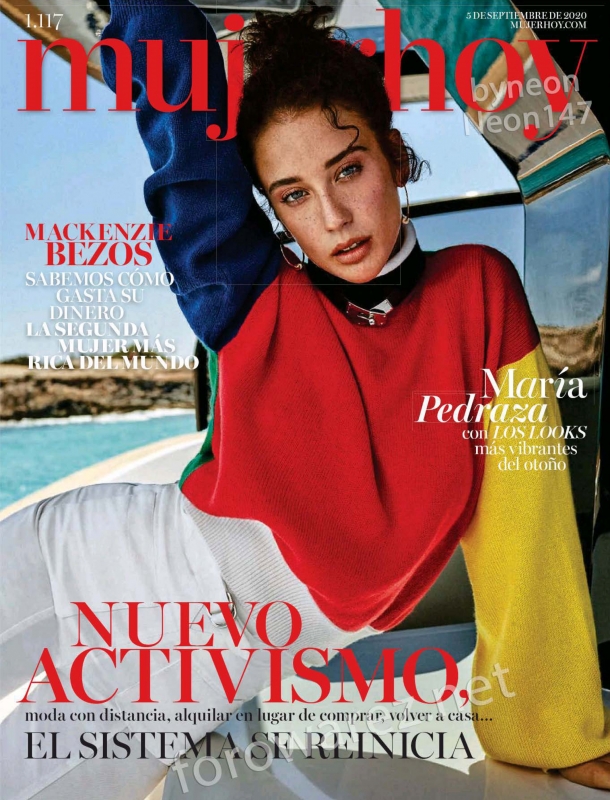We chatted with the actress and dancer, who has Urban. La vida es nuestra on Amazon Prime Video. “Hopefully the platforms will stay for a long time because they have given us a lot of joy. Especially to the actors”, says the young woman, who she acknowledges having been inspired by Sara Socas for her character.
You were shooting in Malaga with Toy Boy and now you’re back with Urban. Can this become a filming city on a par with Madrid and Barcelona? Does it offer what an actor needs?
Yes… I could say that it is like the new Barcelona. A lot of things are being done, a lot of productions, the Malaga Festival brings a lot of people… It’s one of my favorite festivals and I have a great time. You are very comfortable, with that rhythm and those cool productions that are made, but at the same time with the sea next to you, which gives you the tranquility of being at peace. You are saturated with filming, which sometimes happens, and you go to the sea. I feel like a home. For me it is like a second home. I feel that way, because I’ve been here a long time.In this series you sing. How has it been? Did they notify you in advance?
Yes, they told me. It’s very funny: when I was little I used to go into my room to sing karaoke. My parents asked me why I didn’t train my voice. I was dancing, because she was a dancer, and I didn’t educate her… But you are attracting your dreams a bit, and this has been one of them. I knew it from minute 1 and I loved it. On top of that, Lola doesn’t sing, but she tells, because she does cockfights, and she’s very cool. I really like that world, I have been very inspired by Sara Socas, who is a super inspiration for me, I love her. I’ve loved getting into that world so fully, because you live it in such a real way… Asia [Ortega] sings beautifully, and Bernardo [Flores] also sings. And I have lived it very closely.Has the challenge been difficult for you?
No. When I’m ashamed of something, I say to myself: ‘If I’m going to have to do it, what difference does it make?’ I don’t think, I jump in and do it. And on top of that I enjoy it. And it has been like this: I have enjoyed it very much. I’ve had to play the guitar too. I started to try it in confinement, one day I got angry and said that I was not learning any more, and here they have given me the gift of playing the guitar again. And do it with the incredible team of musicians. I was a superfan of Los Serrano, my platonic love was Víctor Elías… And, of course, the great news came to me that he was going to be here. So he was in love. I have had the great pleasure of meeting him and he is amazing. The lyrics and everything they do has love, they are very well written. They are very well accompanied for this series. We did not expect less.Going into the matter, how is Lola’s story?
Lola comes from a wealthy family, with all kinds of comforts, but she is a very sensitive being and feelings are more pervasive than material things. That is why she denies that and goes to the authentic, and seeks authenticity. That’s why she goes with Janet to Malaga, like she goes places alone and puts on headphones and sees people. She always seeks to get inside her. She is very brave and she is not afraid of the void.What kind of relationship does your character have with Asia’s? It seems that it is more than a friendship judging by the advances shown to the press…
Spoilers I can’t do! [Laughs] It’s a series where there are no labels to begin with. No tags or filters. The situation occurs and there is an impact. We are people who collide -I am going to tell it like this- and there is affection, a rapprochement…You were talking about inspiration with Sara Socas. Could you talk to her?
Yes, I spoke to her, actually. I wrote to her on Instagram, she is very busy and she could barely help me with what I was doing, but she already had a team that was helping me, which is the one for this series. We had so little time that we could barely talk, but she did, she told me that if she ever did something else where we had more time and she could sit with me, she would be happy. I’ve seen a lot of his videos. I love it. She arrives and busts it, and Lola has that point that’s a bit unexpected. You see Sara Socas and say, ‘Well…’, and she suddenly arrives and has a devastating force. I was inspired a bit by that: in not noticing that Lola could do what she does, and that she arrives in the first chapter and “boom!”.The platforms have become a new window to show your work. As an actress, how do you live this new panorama with the possibility of your work being seen all over the world almost simultaneously?
Yes, it’s almost simultaneously. Sometimes it is even ephemeral, but it is also beautiful. It is another type of stage that we are experiencing, and the good thing is to settle down even temporarily. Hopefully the platforms will stay for a long time because they have given us a lot of joy. Especially to the actors, who give us so much work, and to the rest of the departments. It amazes me that I have gone somewhere, like Paris, and they know you there. How nice that people, through a series they have seen on a platform, tell you that they loved your work. I’ll stick with that, and with those I’ve lived with on set.You have participated in a few series but all have found a very large audience partly thanks to the platforms. Is there any common link in terms of the sensations that those projects that you have had with respect to Urban have generated in you?
Yes. Something a bit abstract comes in here, which is my intuition. I am guided a lot by intuition. When I am presented with a project I am very lucky and I feel very lucky to have been able to choose thanks to what I have done. In this case, Urban chose me, and I chose Urban. I felt that it was going to be a success not only for the viewer, but also because of how it was presented to me: Jota [Linares] and Ray presented it to me in a way that I believed from minute 1: the photography, the personality of our characters, the link between Janet and Lola… I loved it because it goes a lot with what I like about movies. That magic and this realism, and this series has a lot of that: those shots with a camera over the shoulder, everything kind of dirty but at the same time very true… It gives you the feeling of being inside, and it’s very cool. And that has Urban: it’s something different, indie but with a lot of strength. It is very cool. This project has a lot of soul.How did you experience a shoot as intense as this one? Has it been very different from other previous projects in terms of intensity?
Yes and no, because everything is very fast and very ephemeral. We live in a very hectic way, but within that we have to find enjoyment and stay with things that could be overlooked. I keep everything, everything has stayed in my heart. The characters teach me a lot to be a better person and Lola has taught me a part of me that I didn’t know, which was to be comfortable in solitude. Lola knows how to be comfortable in solitude, but she takes refuge too much not to think about all that emotional burden that she has. Loneliness has made me feel comfortable.What segment of the audience do you think a series like Urban can best connect with, and what do you think are the keys to doing so?
Look, I think with everyone: with adults, with adolescents… It’s a series that many people can connect with, it doesn’t focus only on the adolescent world, because… We’re not teenagers [laughs]. Our characters are entering a stage and embarking on a path in which they are already adults, and are even looking for their place, their success through many failures. It can be seen by all kinds of audiences.You had said that Urban had chosen you. You return here with the director Jota Linares, with whom you made Las Niñas de Cristal, who spoke of demand; this series talks about failure. How long have you lived together and how do you see everything you have done and what has brought you here?
Jolin, we’ve lived so much… Jota has met me and I see myself as when I shot the first film with him, which was [Who would you take to] A deserted island, and I saw myself as a child compared to what I am now. I really feel, and he gives me something to say, like a very woman. It has been precious to be able to grow with him. I have really grown with him, professionally and personally. We’ve been through a lot together, he’s taught me a lot and I hope I’ve taught him a lot too. It’s nice to have gone through a deserted island, through a classical dance and a ballet, and now suddenly go to the music. We have both experienced this for the first time and it has been beautiful.Jota brings out the best in me, and that’s why I love riding with him. But also with Koldo [Almandoz, also director of the series]: it has been a discovery because we didn’t know each other and I love shooting with him. They are beings with different universes but that merge super well. I love it. It has been a discovery and I would like to be able to ride with him again.
What kind of actress are you when approaching the character?
I am very energetic, intuitive… When I read a script, the energy of the character comes to me. She also left a margin for improvisation, because from what we read and what we imagine happens, there is always a difference. I like that the character I’m doing surprises me, and that what has to be generated on set is generated. In the end it is life itself: if you are asking me a question I am going to answer you in another way. Without the other party, we would not have that feedback. Lola has a lot of what I have created, of what I have received from that inner world, but also a lot of what has been generated on set with the whole team. I work like this almost always.
Many times it is either very much in line with the idea that you have imagined or it is something else. That’s why I try not to go with something super defined, because I know that we have to be open as actors to adapt all the time, and that’s why I leave a margin for improvisation. I like when I see myself say: ‘And that? That was not in my plans’. I like to surprise myself. I work a lot with improvisation.What has it been like to record in that deeper Málaga and more of the neighbourhoods, which perhaps clashes with the one that is intended to be sold abroad?
We have been to places with an impressive history, and I am glad to have lived thanks to this project. We have gone to very iconic places, and I have known another Malaga that I had not known. That’s really cool. Maybe you come from abroad and you think you wouldn’t get into certain places… But why don’t you know. It’s great that we have a super team of locations that make something so realistic and nuanced.You have spoken before about the ephemeral nature of our current world. With the platforms allowing and promoting such an “impulsive” consumption of content, are you reluctant that everything ends up turning out so quickly, also for projects that have taken you months to do?
It is what is happening. But I compare it to movies from many years ago and you think: ‘How good that the platforms are.’ A series like Los Serrano is on the platform, or movies like Titanic are restocked in theaters. How precious that it is something so ephemeral but that things are being rescued and are even an inspiration for us, for the actors and all the departments. Everything is feeding back. Yes, it is ephemeral, but there is that other part that gives us the rest mattress. How good that things of one thing or another endure. That gives us security.




Source : vertele.eldiario.es








